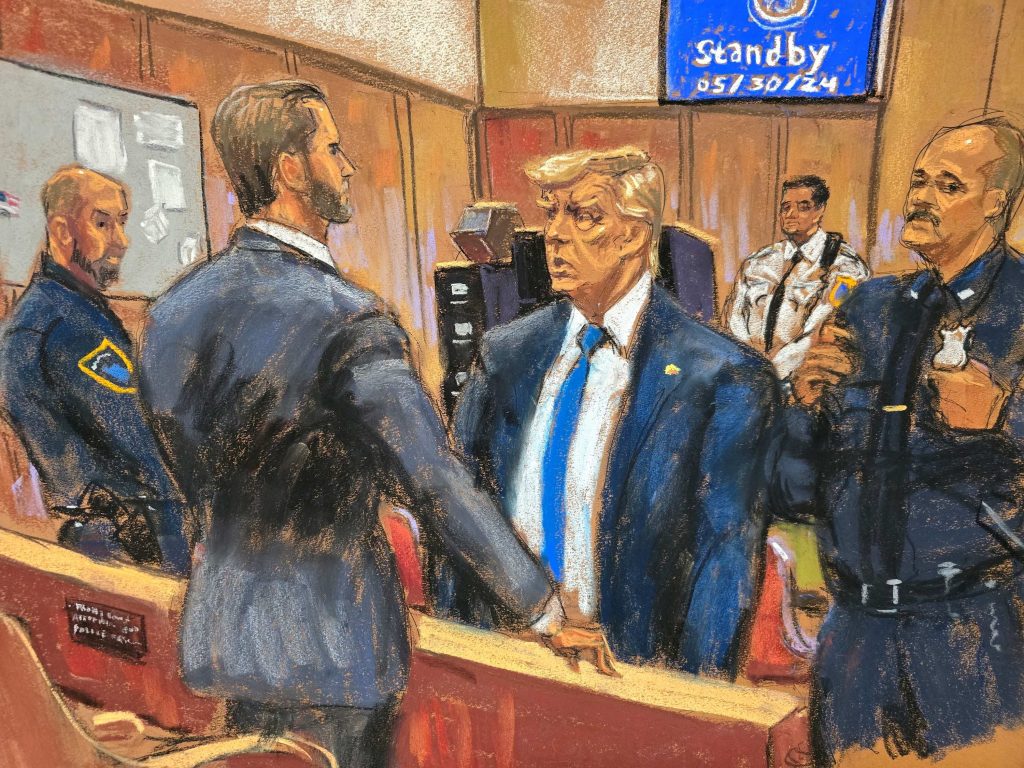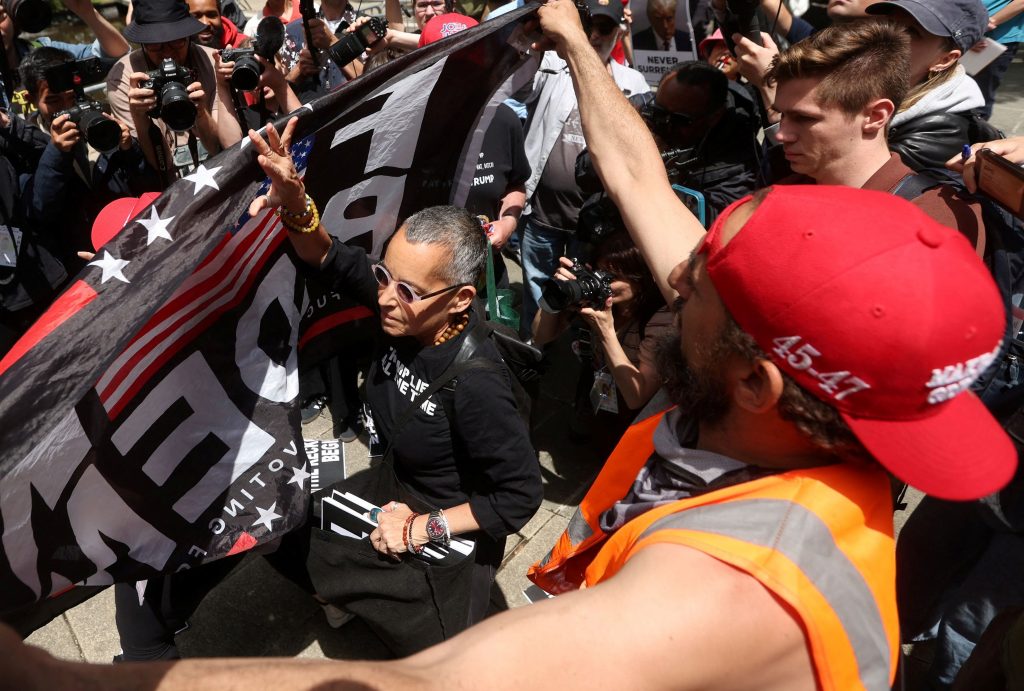Donald Trump became the first former president ever convicted of a crime, with a Manhattan jury finding him guilty of falsifying records to cover up hush money paid to a porn star.
The historic verdict, stemming from conduct that took place around Trump’s remarkable run to the presidency in 2016, could threaten his 2024 bid to return to the White House. Trump can still run and his poll numbers remained steady during the more than monthlong trial, though some voters have said they might be less likely to vote for him if he were convicted.
The presiding judge, Justice Juan Merchan, now faces the unprecedented task of sentencing Trump, 77 years old. The New York offenses were low-level felonies that carry no mandatory punishment, and Manhattan District Attorney Alvin Bragg charged the case in a manner for which there is little precedent. Trump also is a first-time offender with no criminal record.
Such circumstances could make a prison sentence unlikely. Merchan has other penalties from which to choose, ranging from a fine to probation. Trump is certain to appeal, which could take months or years to resolve. The process could be further complicated if Trump, the presumptive Republican nominee, wins a second presidential term.
Trump faces three other prosecutions—two over his alleged efforts to overturn President Biden’s 2020 election victory and one alleging he illegally retained classified documents after leaving the White House—though none may go to trial before Election Day. The hush-money case was considered by many observers to be the least serious of the four.
Bragg, a Democrat, announced the Manhattan case in April 2023, the first indictment of a former president. The district attorney alleged Trump falsified dozens of records to conceal reimbursements to his former fixer, Michael Cohen, for buying the silence of adult-film actress Stormy Daniels. She says she and Trump had an affair, a claim he denies.
New York false-records charges can be a misdemeanor, but Bragg argued they were felonies in this case because Trump committed the offenses in connection with other illegal conduct, namely an unlawful scheme to influence the 2016 election. Bragg didn’t charge Trump with any election-related conduct. The former president has called the prosecution politically motivated, a claim Bragg rejects.
While the case centered on allegedly falsely labeled documents such as invoices and checks, prosecutors told jurors a sweeping story of election fraud, describing a criminal conspiracy with Trump at its center.

Republican presidential candidate and former U.S. President Donald Trump attends his criminal trial, as the jury deliberates in his criminal trial over charges that he falsified business records to conceal money paid to silence porn star Stormy Daniels in 2016, at Manhattan state court in New York City, U.S., May 29, 2024 in this courtroom sketch. REUTERS/Jane Rosenberg
Prosecutors alleged Trump hatched a plan with Cohen and David Pecker, the former publisher of the National Enquirer, to boost Trump’s electoral prospects by purchasing negative stories about him to bury them.
Witnesses testified that urgency within the Trump camp grew in October 2016, with the emergence of a hot-mic “Access Hollywood” recording, in which Trump lewdly referred to grabbing women. “This was a crisis,” former Trump campaign press secretary Hope Hicks testified.
Shortly after, Cohen testified, he learned Daniels was seeking to go public about her alleged 2006 encounter with Trump at a celebrity golf tournament in Lake Tahoe, Nev. Daniels, during two days on the witness stand, said Trump invited her to his hotel to have dinner, where they talked about the business of the adult-entertainment industry and then briefly had sex in his room.
Cohen, the prosecution’s star witness, told jurors that Trump ordered him to make the $130,000 hush-money payment to Daniels when it appeared her story could go public before the election. And Trump approved his reimbursement after he won, Cohen said.
The Daniels payment was first reported by The Wall Street Journal in 2018.
Most defendants don’t testify in their own defense, and Trump opted for that strategy, a reversal after stating before trial that he would take the stand.

A supporter of former U.S. President Donald Trump tries to cover of an activist advocating for Trump to be convicted with a flag during a skirmish outside the Manhattan Criminal Court on the 2nd day of jury deliberations in Trump’s criminal trial over charges that he falsified business records to conceal money paid to silence porn star Stormy Daniels in 2016, in New York City, U.S. May 30, 2024. REUTERS/Mike Segar
Trump’s defense team said seeking to sway voters was legal. “There is nothing wrong with trying to influence an election,” Trump lawyer Todd Blanche told jurors. “It’s called democracy.”
Blanche said the checks to Cohen were for legal services, adding that it was ludicrous to think Trump, while running the country from the Oval Office, was involved with the day-to-day accounting at his New York family business.
Trump’s lawyers sought to undermine the government’s case by portraying Cohen and Daniels as lying opportunists who had built careers off attacking the former president. The defense pointed to Daniels’s “Make America Horny Again” tour, advertised with a picture of her and Trump, and TikTok videos in which Cohen, himself a felon, said he wanted the former president to be imprisoned.
The verdict provides vindication for Bragg, who took a gamble on a case that other prosecutors declined to pursue. Federal prosecutors first investigated the hush-money payments, leading to Cohen’s 2018 guilty plea to campaign-finance violations. But they opted against charging Trump, despite finding that he directed payoffs to two women.
Bragg’s predecessor, Cyrus Vance, then considered state charges, but ultimately favored a broader potential indictment focused on Trump’s business practices. A hush-money case, his team believed, rested on an untested legal theory. He took no action before he left office at the end of 2021.
Alex Leary and James Fanelli contributed to this article.


